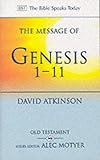 Much of the discussion in evangelical circles about the opening chapters of Genesis revolves around the historicity of the events described, and in particular, whether the six days of creation were ‘literal 24 hour days’ or not. Atkinson does allow himself to get drawn into the complexities of these debates, although his own understanding of the issues becomes apparent. He broadly accepts theistic evolution, noting the structure of the six days of creation in Genesis 1 as being two groups of three, and seeing the first chapter as a hymn of praise. He sees the story as referring to other creation myths only to refute them and assert the one true creator God.
Much of the discussion in evangelical circles about the opening chapters of Genesis revolves around the historicity of the events described, and in particular, whether the six days of creation were ‘literal 24 hour days’ or not. Atkinson does allow himself to get drawn into the complexities of these debates, although his own understanding of the issues becomes apparent. He broadly accepts theistic evolution, noting the structure of the six days of creation in Genesis 1 as being two groups of three, and seeing the first chapter as a hymn of praise. He sees the story as referring to other creation myths only to refute them and assert the one true creator God.
As you would expect, the creation story raises all sorts interesting issues that Atkinson takes up. For example environmental concerns, sexual equality (he is an egalitarian), the nature of time are all discussed. There is also a helpful section on marriage and Christian sexual ethics, where he addresses the issue of homosexuality. He also explores what it means to be made in the image of God, arguing for more than simply having certain capacities, but to be in relationship with God, and to act as his representatives.
Moving on to the story of the fall, Atkinson considers the nature of sin, and considers the origin of evil to be left as a mystery. The commentary on the first three chapters of Genesis fills the first half of the book. Unusually for BST Old Testament volumes, the full text of the first 11 chapters of Genesis is included in the book.
The rest of the book shows how there is repeated sin and judgement, but always with a hint of hope. The story of Cain and Abel provides opportunity to explore the “unfairness” of grace, while the story of the Ark introduces the themes of salvation and covenant. The story of Babel almost leaves us with an unhappy ending, but Atkinson continues the commentary through to 12:3, where the promise of blessing comes to Abraham, and so fittingly, the book closes with its focus on Jesus.
I found this book a very interesting read. The fact that it didn’t answer the type of questions like “was the Ark seaworthy, and large enough to hold all the animals?” meant that there was space to explore the theological themes in the book. His stance on evolution will no doubt please some and irritate others, but the 190 pages given to these opening 11 chapters of Genesis have been well used to explore a wide variety of important subjects.
Those wanting to nail down exact points of doctrine or exhaustively explore the background and possible interpretation of the early Genesis stories will need to consult the more technical commentaries, but those who simply want to get a feel for the story of creation to Abraham without getting embroiled in controversy over science and history, will find much useful material here.

Pingback: wordandspirit » Commentary Series Review – Bible Speaks Today